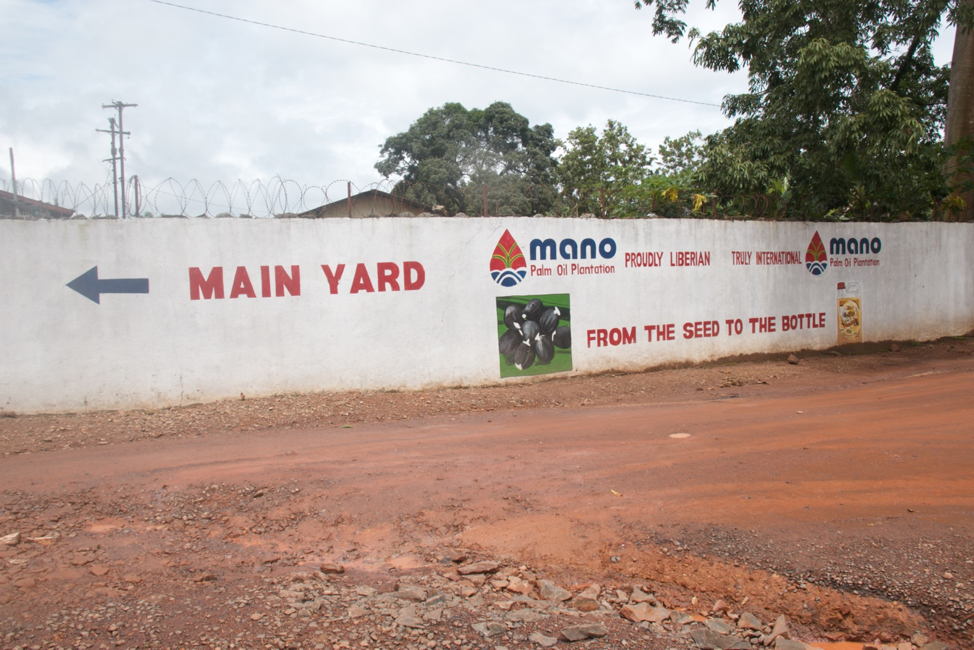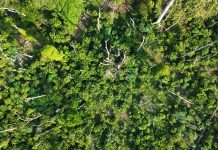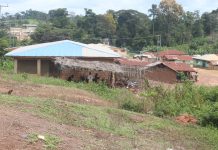Banner Image: A wall of the fence of the headquarters of Mano Palm Oil Industry in Bomi County. The DayLight/Harry Browne
By Emmanuel Sherman
BALLAH TOWN, Grand Cape Mount County – Communities affected by Mano Palm Oil Industries’ plantation have demanded payment of cultural damages agreed by its predecessor Sime Darby.
Sime Darby agreed to pay US$99,999.99 once every six years after a Roundtable on Sustainable Palm Oil (RSPO) report in 2014 found it destroyed communities’ farmlands, ancestral graveyards, shrines, and sacred sites. The full amount after 60 years would amount to US$1 million.
Having paid the first batch of the fund in 2015, the Malaysian company left the country in 2019, turning over its concession to Mano. However, three years since that takeover, Mano is yet to pay the damages.
“We want the full amount of the money to be paid,” Said Alex Balo, Grand Cape Mount County coordinator of the National Civil Society Council of Liberia in a mobile interview with The DayLight on Monday. “If they cannot accept the demands of the people, we will protest and shut down the company’s operations.
“Maybe that’s the only language they can hear.”
Before Sime Darby’s departure, it deposited US$66,666.64 into Mano’s coffers for four years (2016-2019). Mano should add another US$33,333.32 and give the full amount to 17 project-affected communities, according to the RSPO report. But the company only wants to pay what Sime Darby left, demanding a new agreement with villagers.
“Our first objective as a new company was for SDPL to execute liabilities to communities and employees to enable us to offer new employments with new terms and conditions and to also sign new [agreements] with communities,” said Adama Seh, corporate communications manager at Mano. “Therefore, like severance benefits paid, the money towards intergeneration cultural endowment funds was [Sime Darby’s] obligation and paid by them.” He said Mano would work with the National Bureau of Concessions (NBC) to derive a new agreement that will indicate what Mano will be pay, “to reflect current realities and our company’s name.”
Amadu Fahnbulleh, an executive of the project affected communities (PAC)—which manages the cultural endowment fund and represents the communities’ interest—said they were not willing to accept part payment. “There must be a definite time and position on the payment of the money,” Fahnbulleh said in an interview in Ballah Town, which hosts the office of the PAC.
Sime Darby’s payment of the intergenerational cultural endowment fund was meant to address its clearing of the communities’ sacred sites and burial grounds in 2011. It followed demarcation and participatory mapping of 3,352 hectares at US$6 per hectare of all 17 communities.
The Malaysian company had signed a 63-year agreement with Liberia covering 220,000 hectares of land in the northwestern part of the country. Locals played no role in the agreement, which set the stage for protest and the complaint to the oil palm global watchdog.
Unlike its predecessor Sime Darby, Mano is not a member of the Roundtable on Sustainable Palm Oil (RSPO), the global watchdog of the oil palm industry. However, several national and international laws and protocols call for companies’ recognition of cultural rights, including Liberia’s Land Rights Act of 2018, the United Nations Declaration on Human Rights and the 2001 UNESCO Declaration on Cultural Diversity.
Recently, there was a riot in the Behsoa community in the Senjeh District of Bomi County after police officers allegedly ransacked a Sande bush in search of “stolen” palm nuts and mills.





Facebook Comments